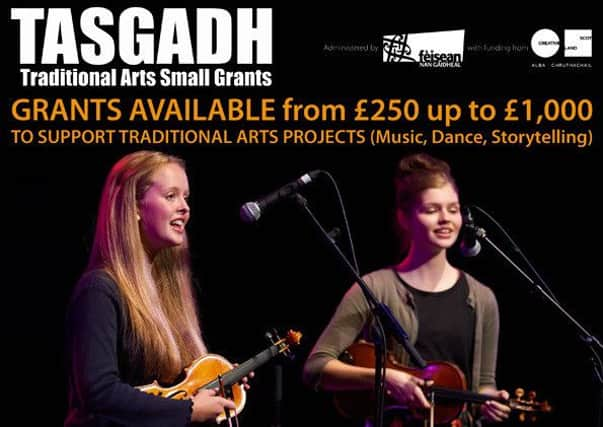Traditional arts fund continues


The fund is managed by Fèisean nan Gàidheal and supported by Creative Scotland through Targeted Funding.
It is available to provide support for traditional artists and organisations to create, perform, tour and showcase work. Professional development applications can also be supported though the fund.
Advertisement
Hide AdAdvertisement
Hide AdThere are two further deadline dates for Tasgadh applications during 2016-17, the first of those being 30 September 2016.
Guidelines and application forms are available at feisean.org/tasgadh where a full list of grants offered is also published.
In 2015-16 Tasgadh attracted 116 applications and was oversubscribed, in common with most grants schemes, with funding requested equating to 359% of the total available for distribution. 64 grants were approved comprising 43 for music projects, 4 for dance, 9 for storytelling and 8 for multi art-form projects.
Fèisean nan Gàidheal Chief Executive, Arthur Cormack, welcomed the on-going commitment from Creative Scotland: “Tasgadh has proved there is a need within the Traditional Arts sector for access to small grants which are relatively light touch and offer a fast decision.
Advertisement
Hide AdAdvertisement
Hide Ad“Creative Scotland continues to support traditional arts directly and will deal with larger projects through other routes, but we are very happy that they have undertaken to fund Tasgadh in 2016-17 with £31,500 available to disburse to Scottish traditional music, dance and storytelling projects.”
Brian Ó hEadhra, Gaelic Arts & Culture Officer at Creative Scotland said: “We are very happy with the range of applications to the Tasgadh fund and commend Fèisean nan Gàidheal on their ongoing work in promoting and administering the scheme.
“We still encourage individuals and groups working in the traditional arts field to look at this fund for support and particularly welcome applicants working in Gaelic, Scots and hard to reach audiences.”